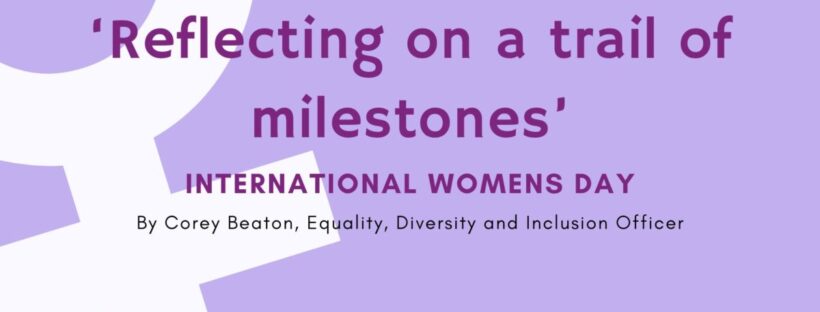by Corey Beaton (EDI Officer)
When we consider the gender balance of our lecture halls, it is hard to imagine a time when women were not permitted to study the law, nor indeed to go on and practice it, yet it has only been just over a century since Parliament removed the legal barriers to a woman’s ability to practice through the Sex Disqualification (Removal) Act 1919.
Prior to this, though, the courts upheld the rule that a woman was not entitled to practice, not on the basis of her qualifications nor aptitude, but solely of her gender. The case of Hall v Incorporated Society of Law-Agents (1901) 3 F 1059, which challenged the wording and intention of the Law Agents Act 1873 through statutory interpretation, is but one of innumerable examples of this practice. Here, with no explicit inclusion or exclusion of women in the 1873 Act, and in spite of the fact that only men had been admitted as lawyers, the court ruled that a woman was not a ‘person’ for the purposes of the Act.
What we thankfully see nowadays is the polar opposite of what we would expect to see if we were to walk the halls of an early twentieth century university, or indeed a law firm or court building. In Scotland, both our Law Officers are women, the second-most senior judge of the Court of Session is a woman, two-thirds of law students are women, 70% of legal trainees are women, and perhaps a bit closer to home, all of the Law Clinic’s staff and student directors are women.
It is a reasonable assumption that none of these women would say that it has been an easy process for them to attain the positions they now hold. Who would, when we consider the societal and institutional barriers which women continue to face in our profession?
While almost 60% of our profession consists of female lawyers, only one large-scale Scottish law firm has a majority of female partners. At a societal level, figures continue to suggest that one in three women will experience a sexual assault in their lifetime. In the wake of newly-released data which indicates an uptick in sexual crime in the past year – that is to say, those crimes which have been reported – this ratio is only likely to increase unless something meaningful is done about it.
In response, what we are now seeing in the Scottish Parliament is a debate over a long-awaited Bill which is designed to return to victim-survivors of sexual offences the agency which many have long since lost following their assaults, the ability to effectively represent themselves in section 275 hearings, and the empowerment to give their best evidence in court with the support of various vital special measures.
Only today did we learn that victim-survivors will soon be able to access a copy of their court transcripts from their rape trials for free. One campaigner for this change shared her experiences of having to crowdfund to pay for access to her transcript in order to combat an appeal lodged by her convicted rapist against his sentence.
We can no longer look at the experiences and treatment of women at the hand of the law in a vacuum; only by recognising and acting to defeat the intersectional, institutional barriers which women and girls across Scotland face can we truly take meaningful strides towards an equitable and just society which no longer puts walls up against a woman’s ability to thrive, but instead breaks them down.
We are, after all, a nation of firsts: the first practicing lawyer as Madge Easton Anderson was, the first woman called to the Scottish Bar as Margaret Kidd KC was, the first woman appointed as a Senator of the College of Justice as the Rt Hon Lady Cosgrove CBE was, and the first woman appointed as Solicitor General and Lord Advocate as Dame Elish Angiolini KC was. Our legal system is peppered with women who overcame the odds which were stacked against them to rise to the positions they all held.
As Lady Cosgrove once said in a speech to law students at Strathclyde,
“The public must have confidence that its legal system is representative of and has the ability to respond to and deal with the needs and problems of all of its citizens. A profession which is not truly representative of all of its citizens cannot enjoy that confidence. The increasing presence of women in the profession will, I believe, be a positive force.”
Lady Cosgrove
You know as well as I do that Her Ladyship’s words are truer now more than ever. The law is certainly not short of female role models, and I would encourage any woman reading this to remember the role they can play as someone else’s role model.
